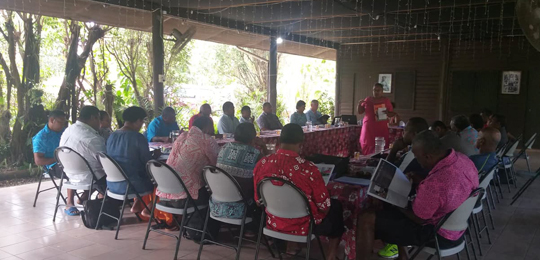July 2019
Farmer to Farmer Learnings

The 1 day workshop saw tilapia farmers from around Fiji elect their very first executive committee
The Pacific Island Farmers Organisation Network (PIFON) signature Farmer to Farmer (F2F) Learnings today opened its first ‘Tilapia Farmers Having Their Say’ workshop at South Sea Orchids in Nadi.
Eighteen Tilapia Farmers from Viti Levu and Vanua Levu met to discuss the formation of a farmers association and an industry plan for further development with the assistance of the Ministry of Fisheries and the Pacific Community (formerly known as South Pacific Community).
Fiji’s Ministry of Fisheries Acting Principal Fisheries Officer Aquaculture, Jone Varawa said in the last inventory undertaken (2009) by the ministry, there was 425 tilapia farmers in Fiji and the government was looking to encourage tilapia farming to help address food security concerns.
‘Our demand for fish is about 23kg per person in a year and because of the current seasonal ban for reef fish like coral trout and grouper, tilapia is very important to cater for the demand during this ban period.’ He added Fiji has great potential for tilapia farming with its natural resources and the existing market opportunity.
Tilapia Farmer, Arun-lata Ram shared her concerns on the cost of tilapia feed which she said continually increased.
‘It will be the most expensive cost for anyone coming into this area of farming, it keeps increasing. The feed is imported from Australia and New Zealand which is made of wheat, rice bran and soya bean including other protein and minerals which isn’t available locally.’
Echoing similar statements, Penina Ravunamoce, an aquaculture intern of the Pacific Community said the challenge for those starting up in tilapia farming was the availability of tilapia fingerlings, ‘the supply is quite low and we’re also seeing the cost of feed continually fluctuating which poses a problem for new incoming tilapia farmers.’
She also highlighted the need for tilapia farmers to start exploring local alternatives like tapioca or copra for tilapia feed.
Taro farmer, Amelia Vatukatakata was also a participant at the workshop and is new to tilapia farming, ‘My husband and I applied to get a pond and we were one of the 23 farmers selected by the Ministry of Fisheries to be part of a project. We’ve only been in this area of farming for a month and a half now, and we’re enjoying the pace which is relaxed compared to taro farming which can be labor intensive.’
She added the changing temperatures between day and night in Tavua could be a challenge for the farm and needed to be controlled.
The 1 day workshop also saw the formation of a farmers association, Tilapia Fiji. Newly elected President, Katarina Baleisuva says she looks forward to working together with her committee in the next three years.
‘This is a very big achievement for tilapia farming and having worked in the industry for six years, I’m very familiar with the issues involved with our farmers, my committee will be working together in the best interests of our members.’
PIFON’s project partner, Pacific Agribusiness Research in Development Initiative (PARDI), played an instrumental role in the introduction of the workshop. Research Scientist, Salote Waqairatu said it was the first for Aquaculture to feature in the activities for PIFON.
‘Its been enjoyable to coordinate the arrival of lead farmers from various clusters across Fiji including Nadi, Labasa, Rakiraki, Tailevu, Ba, Tavua and Nadroga.’
Tilapia Fiji will meet for their second AGM in July 2020.
